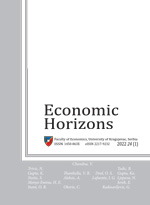THE CORPORATE TAX PLANNING AND FINANCIAL PERFORMANCE OF SYSTEMICALLY IMPORTANT BANKS IN NIGERIA
Temitope Olamide Fagbemi1, Taiwo Azeez Olaniyi1 and Ayobolawole Adewale Ogundipe2
1Department of Accounting, Faculty of Management Sciences, University of Ilorin, Ilorin, Nigeria
2Department of Accounting, Ekiti State University, Ado Ekiti, Nigeria
Due to the multiplicity and overburdening of Nigeria’s tax system, the economic units in which systemically important banks (SIBs) are included implement the corporate strategies that identify the loophole which minimizes, postpones, or entirely avoids tax payments so as to reduce its negative effect on financial performance. Therefore, this study examined the corporate tax planning and financial performance of systemically important banks in Nigeria. Ex-post facto was adopted as the research design in this study, while Pooled OLS was used to analyze the data. This study has shown that the effective tax rate has a negative and significant impact on financial performance. Thin capitalization has a positive significant impact on the financial performance of SIBs in Nigeria, whereas capital intensity and the lease option have demonstrated an insignificant impact on the financial performance of SIBs in the country. The study concluded that corporate tax planning affects financial performance depending on the adopted tax planning strategies. Likewise, the study recommended, among other things, that the tax authorities should engage in the tax reforms whereby the corporate tax rate is to be adjusted, and that banks should engage in the activities that can reduce the effective tax rate.
Keywords: capital intensity, effective tax rate, financial performance, systemically important banks, tax planning, thin capitalization
JEL Classification: M410




